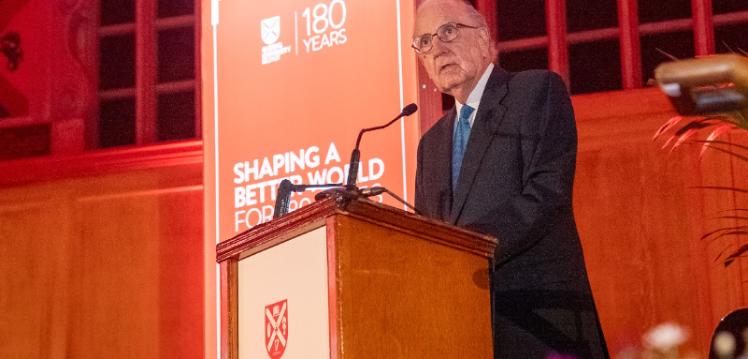
In a time when peace and stability are more fragile than ever, the role of young people in shaping a sustainable future has gained increasing recognition. Queen’s University Belfast stands at the forefront of this movement, emphasizing the importance of youth engagement in fostering lasting peace on the island of Ireland. Recent visits by influential figures like Senator George Mitchell highlight the critical role that the next generation plays in maintaining and advancing peace, social inclusion, and political stability.
The Significance of Youth Engagement in Sustaining Peace
With the history of conflict and reconciliation in Northern Ireland, the importance of involving young people in peace processes cannot be overstated. Queen’s University Belfast actively promotes this engagement through academic programs, community initiatives, and events aimed at empowering youth to become active participants in shaping their society. The university believes that youth are not just beneficiaries of peace but also essential contributors to its continuity and evolution.
Building Awareness and Understanding
Educational institutions like Queen’s University offer courses and workshops that deepen young people’s understanding of the complex history of the conflict, peace negotiations, and the ongoing challenges faced. By fostering awareness, students develop the critical thinking skills necessary to navigate and influence social and political dynamics positively. Such awareness encourages a sense of responsibility, inspiring students to participate in community projects and dialogue initiatives.
Encouraging Active Participation
Active involvement in political and social activities equips youth with a voice and a platform to influence change. Queen’s University Belfast promotes participation through student-led organizations, debate forums, and leadership development programs. These avenues enable young people to engage with policymakers, community leaders, and peers, contributing to a culture of inclusive dialogue and collective problem-solving.
Queen’s University Belfast’s Initiatives Supporting Youth in Peacebuilding
Queen’s University Belfast has established numerous programs aimed at fostering youth empowerment and peacebuilding. These include research projects on social cohesion, partnerships with community organizations, and international exchanges that expose students to diverse perspectives. The university’s commitment is evident in its collaboration with organizations like Politics in Action, which mobilizes youth to actively participate in political processes and community development.
Programs and Partnerships
Through initiatives like the Politics in Action campaign, students are encouraged to use their voices for positive change. Workshops, seminars, and panel discussions featuring influential leaders like Senator Mitchell serve as platforms for learning and inspiration. Such programs highlight that sustainable peace is an ongoing effort requiring active participation from each generation.
Research and Innovation
Research at Queen’s University explores themes related to social justice, conflict resolution, and community cohesion. These academic pursuits provide valuable insights into effective peacebuilding strategies, equipping students with the knowledge and skills to contribute meaningfully to societal progress. Engaging in research fosters a sense of ownership among youth over their societal future.
Lessons from Senator George Mitchell’s Visit
Recently, Senator George Mitchell returned to Queen’s University Belfast to deliver an inspiring message: ongoing peace efforts require the active participation of young people. During his visit, he emphasized that the peace achieved since 1998 is a continuous journey, one that demands hope, ownership, and resilience from the next generation.
Passing the Torch
Senator Mitchell’s call to youth centered around “passing the torch”—a metaphor for responsibility and continuity in peacebuilding. He urged young people to take ownership of their future, to stay true to their dreams, and to actively contribute their voices to society. His words resonated deeply with students and community members, reinforcing the vital role of youth in maintaining social harmony.
Inclusivity and Dialogue
The senator’s visit also underscored the importance of inclusivity in dialogue. Young people from diverse backgrounds, including students from different regions and communities, discussed how to promote understanding and empower marginalized voices. Such conversations exemplify how university platforms can nurture a culture of openness, respect, and shared purpose.
How Young People Can Contribute to Peace Today
Building and sustaining peace is an active process that extends beyond historical agreements. Young people can take concrete steps to make a difference through:
- Engaging in Community Service: Volunteer in local initiatives that promote social cohesion and inclusion.
- Participating in Educational Programs: Join workshops, seminars, and courses offered by universities like Queen’s to deepen understanding and develop leadership skills.
- Using Digital Platforms: Leverage social media and online forums to spread messages of unity and challenge hate speech.
- Voting and Political Engagement: Exercise the right to vote and participate in civic discussions to influence policy decisions.
- Cultivating Dialogue: Foster conversations among peers from different backgrounds to build trust and empathy.
Conclusion: Empowering the Next Generation for a United Future
The future of peace on the island of Ireland hinges on the active engagement of its youth. Queen’s University Belfast’s focus on education, community involvement, and research empowers young people to become leaders in peacebuilding. As Senator George Mitchell reminded us, hope must be sustained by action—each individual’s efforts contribute to a wave of positive change that can move society toward greater unity, understanding, and stability.
**If you are passionate about making a difference and want to explore further opportunities in peacebuilding and youth leadership, consider engaging with programs at Queen’s University Belfast.**

